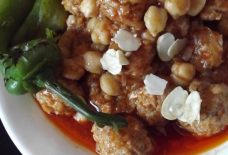Seeds, Seeds, and More Seeds
By Katie Teague/Arab America contributing writer
Middle Eastern food is, without a doubt, never boring. Who knew that a culture with such rich and colorful foods would fail to survive without…seeds? That’s right. Arabs are the number one consumers of nuts and seeds; whether it’s in their food or served by itself as a snack.
Let’s take a look into the most popular choices, with analysis of health benefits by Healthline.com:
1. Pumpkin Seeds
This seed has an endless number of health benefits- and it tastes good too! “Pumpkin seeds are highly nutritious and packed with powerful antioxidants. Eating them can help solve dietary deficiencies and may protect against various health problems. In fact, pumpkin seeds have been shown to improve heart health, blood sugar levels, fertility, and sleep quality. They may even protect against certain types of cancer. In addition, their rich nutrient content may provide other health benefits, such as improved energy, mood, and immune function.”
A 1-ounce (28-gram) serving contains (1):
- Fiber: 1.7 grams
- Carbs: 5 grams
- Protein: 7 grams
- Fat: 13 grams (6 of which are omega-6s)
- Vitamin K: 18% of the RDI
- Phosphorus: 33% of the RDI
- Manganese: 42% of the RDI
- Magnesium: 37% of the RDI
- Iron: 23% of the RDI
- Zinc: 14% of the RDI
- Copper: 19% of the RDI
2. Sunflower Seeds
By far the most popular choice, you won’t leave the Middle East without having seen a ton of Arabs snacking on sunflower seeds. Pick your favorite flavor of roasted sunflower seeds and enjoy!
One ounce (28 grams) of sunflower seeds contains (44):
- Calories: 164
- Fiber: 2.4 grams
- Protein: 5.8 grams
- Monounsaturated fat: 5.2 grams
- Omega-6 fats: 6.4 grams
- Vitamin E: 47% of the RDI
- Manganese: 27% of the RDI
- Magnesium: 23% of the RDI
3. Watermelon Seeds
What is instantly discarded in the West is a bit of a treasure in the Middle East, which is unsurprising given Arabs’ love for watermelon. The seeds are always roasted before being served as a snack. They are also full of nutritional benefits:
- 100 grams of watermelon seeds provide 600 calories. It is the same as 10 slices of bread.
- 400 calories are provided in the fat of watermelon seeds. The fat level in 100 grams of watermelon seeds is around 80% of our daily fat.
- 1/3 of watermelon seeds contain protein. The most essential protein in watermelon seeds is nisin.
- Produced watermelon seeds are a good source of vitamin B such as thiamine, niacin, and folic.
- 100 grams of watermelon seeds contains minerals such as magnesium (139%), manganese (87%), phosphor (82%), zinc (74%), iron (44%), potassium (20%) and copper (37%) among our daily mineral intake
4. Pistachios
These tasty nuts are high in protein and antioxidants, and low in calories. Also, “their essential amino acid content is higher than any other nut.”
A one-ounce (28-gram) serving of pistachios contains roughly:
- Calories: 156
- Fat: 12.5 grams
- Protein: 6 grams
- Carbs: 8 grams
- Fiber: 3 grams
- Vitamin E: 3% of the RDI
- Magnesium: 8% of the RDI
5. Almonds
When traveling through the Middle East, you are sure to see carts full of almonds being sold in souks. Many Arabs serve almonds to guests upon entry into their homes. They also make a great snack.
One serving — 28 grams or a small handful — packs roughly:
- Calories: 161
- Fat: 14 grams
- Protein: 6 grams
- Carbs: 6 grams
- Fiber: 3.5 grams
- Vitamin E: 37% of the Reference Daily Intake (RDI)
- Magnesium: 19% of the RDI
Next time you head to the grocery store and are looking for snacks, consider following the Arabs by picking up a variety of seeds and nuts. With tasty flavors and endless health benefits, what more could you want in a snack?
See more stories about Arab Americans on our Blog









